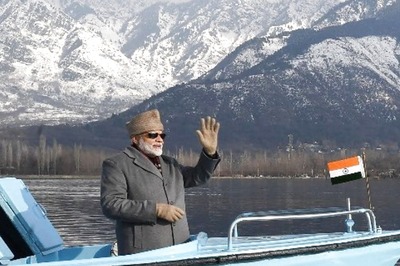
views
New Delhi: No love is immune from heartbreak, whether it is between opposite or same sex. There will also be an unrequited one. The pages of literary history are abundant with tales of jilted lovers. One such saga is that of one-sided love between author EM Forster and Sir Syed Ahmed Khan’s grandson Ross Masood, an educationist.
There have been many articles and analysis on how Forster’s work, particularly Maurice and Passage to India, were shaped by his emotions and love for Masood.
In 1906, Forster started to tutor young Syed Ross Masood in Latin in suburban Surrey, Weybridge. He was preparing Masood for an Oxford degree. “Forster fell in love with Masood; while his feelings were unreciprocated. Though the two developed a close friendship and Forster claimed it was through Masood that he developed a lifelong and passionate interest in India, particularly Muslim India,” said the Open University’s introduction on EM Forster under the ‘Making Britain’ theme.
It was also through Masood that he met several other young Indians studying in Britain in the early 20th century, many of whom went on to assume important professional roles, including government positions in India.
Kiss of Unreciprocated Love
Forster’s occupation with writing gay-themed stories resulted in the most significant one, Maurice, which was published in 1971, a year after Forster’s death. The book After the Victorians: Private Conscience and Public Duty in Modern Britain, edited by Peter Mandler and Susan Pedersen, says that 1910 was an important year for Forster for a number of reasons, apart from the novel Howard Ends.
“It was then that he had declared to his young Indian friend, Sayed Ross Masood, his great passion for him. Even though it was rebuffed, it represented a significant step towards the resolution of a sexual identity. However, painful…” the book reads.
Authors underline that Forster needed to come to terms with his success. He needed to come to terms not only with the message of rejection of him as a lover, but also with the continuation of their intense friendship.
In 1912, Forster began work on Arctic Summer, which he abandoned and then during the next two years he wrote Maurice, his novel “of an idealized fulfilled ultimately happy homosexual love, a daydream book, so to speak which could not be published before his death.”
It is widely known that Forster visited India on Masood’s request and dedicated Passage to India to this friend. Damon Galgut later completed the book, which is an account of Forster’s life. Galgut wrote in The Guardian: “But when they are together during Forster’s first trip to India, shortly before the Great War, Masood sharply rebuffs the writer’s attempted kiss, leaving Forster to conceal an angry shame during one more well-practiced retreat into the willed cheerfulness of his usual life, mild and diligent.”
There is much conjecture that something must have happened between the two men that night. Galgut finds his account of that night “frustratingly opaque”. After being rebuffed, Forster took the ride to the caves next morning that was organized by Masood to provide some reprieve from the heartbreak. Forster faced rejection and love at the same time…
Sexual Reveries for Masood
Pakistani academic Tariq Rahman wrote in his work that RW Noble conjectured with reason. “The outline on his folios could be an expression of Foster’s sexual reveries about Masood.”
‘Aziz’, a character in Passage of India, is believed to be modelled on Masood and ‘Fielding’ modelled on Foster. Rahman added in his work that “Foster’s use of word charming for both Aziz and Masood suggests that he responded to them in similar ways, especially since this was a code word both Forster and GL Dickinson, a homosexual and don at Cambridge used for young men they found attractive.”
Forster also used the word “beloved” for ‘Aziz’, the character.
“The use of ‘beloved’ is warranted only on the assumption that Dickinson knew whose beloved was being referred to. In the surface text, however, Aziz is nobody’s beloved. This suggests that Forster is referring to his own beloved and Dickinson, being a close friend is aware of this,” said Rahman in his book, adding that “Passage of India has an under text (plot) which is really about homosexual love – Dickinson’s warmth of sympathy”.
Why the Love was Not Reciprocated
Though Forster lived to see the legalisation of homosexuality in Britain, he never ‘came out’ publicly. For Forster, “love for Masood remained frustrated,” wrote Rahman.
Taking the attention to Masood is the famous author Zareer Masani, who wrote in The Independent that he sifted through unpublished letters of Foster and realised that there was change in tone and passion over the period of time, with Masood.
During Masood’s undergraduate years at Oxford, Foster and Masood wrote to each other almost every day. Masani spent an afternoon leafing through their letters and was amazed by their romantic intensity, he wrote, “Their longing to be alone together leaps off the pages, and Masood sounds every bit as emotionally involved as his mentor. And then, quite suddenly, Masood’s letters become more formal, he stops calling Forster ‘My Dearest’.”
Masani provided sense to the reason behind this one-sided same sex love story, he recognised a pattern of “male love quite common in the subcontinent where the most intense and physically demonstrative same sex relationships are acceptable as long as they are not explicitly sexual”.
“Forster crossed this line in confessing the true nature of his love to Masood, who felt obliged to make it clear that he could not reciprocate,” explained Masani.




















Comments
0 comment